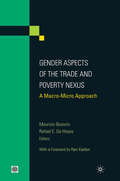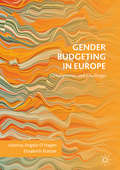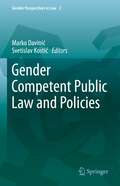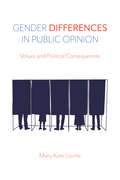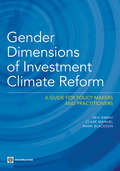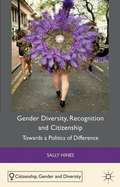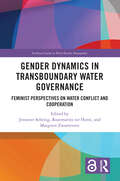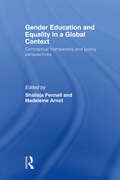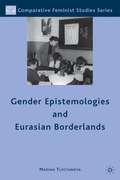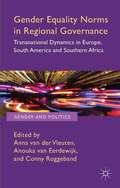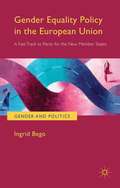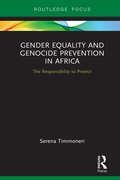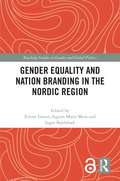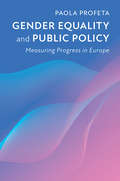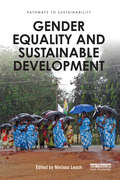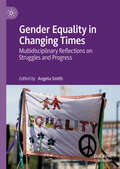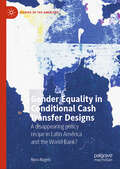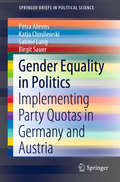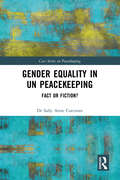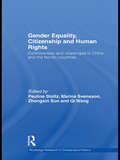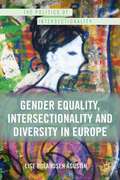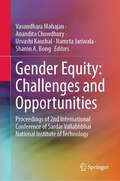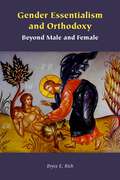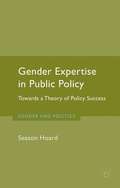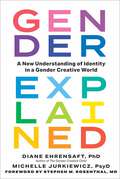- Table View
- List View
Gender Aspects of the Trade and Poverty Nexus
by Maurizio Bussolo Rafael E. De Hoyos Ravi KanburTrade liberalization can create economic opportunities for poor people. But are these opportunities available to men and women equally? Do the gender disparities in access to education, health, credit, and other resources limit the gains from trade and the potential benefits to poor women? This volume introduces the gender dimension into empirical analyses of the links between trade and poverty, which can improve policy making. The collection of chapters in this book is close to an ideal macro-micro evaluation technique that explicitly assesses the importance of gender in determining the poverty effects of trade shocks. Part I, relying on ex ante simulation approaches, focuses on the macroeconomic links between trade and gender, where labor market structure and its functioning play a key role. Part II concentrates on micro models of households and attempts to identify the ex post effects of trade shocks on household income levels and consumption choices. It also addresses questions about possible changes in inequality within households due to improved economic opportunities for women. 'Gender Aspects of the Trade and Poverty Nexus' will be invaluable to policy makers, development practitioners and researchers, journalists, and students.
Gender Budgeting in Europe: Developments And Progress
by Angela O'Hagan Elisabeth KlatzerThis book takes a broad look at conceptual and practical applications of gender budgeting in Europe. It comprises three linked sections that work through conceptual definitions of gender budget analysis. These sections explore how it can be framed and constructed as a gender equality policy; investigate case studies across Europe; and examine challenges for implementation. The first book of its kind, Gender Budgeting in Europe explores conceptual and methodological variations evidence in practice in Europe and the challenges of adoption and implementation in different political and institutional contexts. It brings together historical and current conceptual developments and tensions; approaches, methodologies, and tools in practice across Europe; activism, actors and agency and the engagement of formal institutions at all levels of government with feminist policy changes and feminist analysis and activists. This text is fascinating reading for students, scholars, policy makers and activists.
Gender Competent Public Law and Policies (Gender Perspectives in Law #2)
by Marko Davinić Svetislav KostićThis book offers a new perspective on public law and public policies. The collection of papers gathered here begins with an in-depth discussion on gender perspectives in constitutional law, which can support gender justice, but also perpetuate patriarchal norms. The book then analyzes the role of the European Ombudsman in the area of gender discrimination. Despite its limited jurisdiction, this institution has become a significant complementary tool in the protection of gender equality and the elimination of gender discrimination at the EU level. Particular attention is paid to the importance of mainstreaming gender into public policies. Thus, the legal and institutional frameworks of Spain and Serbia are presented, which can serve as an inspiration to other countries. Another important aspect covered in the book is an analysis of systemic differences between the average wages of women and men in the six countries of the Western Balkans. In turn, the book presents a discussion on female genital mutilation as a highly gendered crime based on extreme versions of rigid, patriarchal ethnic and religious norms and customs. It is analyzed through the lenses of the Istanbul Convention, as a tool for combating violence against women. Particular attention is paid to femicide, its definitions, forms, and phenomenological characteristics. Having been only recently acknowledged, femicide is still characterized by an inadequate judicial response in many countries. In this regard, a special focus is on German and Serbian experiences in acknowledging femicide and combating it through various measures. Finally, the importance of stalking laws is discussed, as stalking is a highly gendered crime that many states fail to combat adequately. The collection of essays offered in this book will be of interest to all those working in the field of public law, to policymakers, and to students and academics looking to broaden and deepen their research on various issues in public law and policies from gender perspectives.
Gender Differences in Public Opinion: Values and Political Consequences
by Mary-Kate LizotteIn this era in which more women are running for public office—and when there is increased activism among women—understanding gender differences on political issues has become critical. In her cogent study, Mary-Kate Lizotte argues that assessing the gender gap in public support for policies through a values lens provides insight into American politics today. There is ample evidence that men and women differ in their value endorsements—even when taking into account factors such as education, class, race, income, and party identification. In Gender Differences in Public Opinion, Lizotte utilizes nationally representative data, mainly from the American National Election Study, to study these gender gaps, the explanatory power of values, and the political consequences of these differences. She examines the gender differences in several policy areas such as equal rights, gun control, the death penalty, and the environment, as well as social welfare issues. The result is an insightful and revealing study of how men and women vary in their policy positions and political attitudes.
Gender Dimensions of Investment Climate Reform: A Guide for Policy Makers and Practitioners
by Sevi Simavi Clare Manuel C. Mark BlackdenThe economic empowerment of women is increasingly seen as one of the most important forces behind economic growth and the fight against poverty. Indeed, women's economic participation in an economy as entrepreneurs, employees, and leaders is recognized as a measure of a country's dynamism and viability. 'Gender Dimensions of Investment Climate Reform' provides fresh solutions to common issues that women entrepreneurs face. It presents actionable, replicable, and scalable tools for promoting gender-sensitive investment climate reforms that would benefit both women and men. The book enables development practitioners and policy makers who are not gender specialists to diagnose gender issues in an investment climate; design creative and practical solutions and recommendations for addressing gender constraints; and monitor and evaluate the implementation of those recommendations.
Gender Diversity, Recognition and Citizenship
by Sally HinesThis book examines the meanings and significance of the UK Gender Recognition Act within the context of broader social, cultural, legal, political, theoretical and policy shifts concerning gender and sexual diversity, and addresses current debates about equality and diversity, citizenship and recognition across a range of disciplines.
Gender Dynamics in Transboundary Water Governance: Feminist Perspectives on Water Conflict and Cooperation (Earthscan Studies in Water Resource Management)
by Jenniver Sehring Rozemarijn ter Horst and Margreet ZwarteveenThis volume assesses the nexus of gender and transboundary water governance, containing empirical case studies, discourse analyses, practitioners’ accounts, and theoretical reflections. Transboundary water governance exists at the intersection of two highly masculinised fields: diplomacy and water resources management. In both fields, positions are mainly held by men, and core ideas, norms, and guiding principles that are presented as neutral, are both shaped by men and based on male experiences. This book sheds light on the often hidden gender dynamics of water conflict and cooperation at the transboundary level and on the implicit assumptions that guide research and policies. The individual chapters of the book, based on case studies from around the world, reveal the gendered nature of water diplomacy, take stock of the number of women involved in organisations that govern shared waters, and analyse programmes that have been set up to promote women in water diplomacy and the obstacles that they face. They explore and contest leading narratives and knowledge that have been shaped mainly by privileged men, and assess how the participation of women concretely impacts the practices, routines, and processes of water negotiations. This volume will be of great interest to students and scholars of water governance, water diplomacy, gender, international relations and environmental politics. It will also be of interest to professionals and policymakers involved in supporting gender mainstreaming in water cooperation.
Gender Education and Equality in a Global Context: Conceptual Frameworks and Policy Perspectives
by Shailaja Fennell Madeleine ArnotThe Millennium Development Goals aim to achieve basic education for all by 2015. But can such global agendas address national and local gender inequalities and will they empower women through education? This thought-provoking book offers an opportunity to engage critically with existing and emergent conceptual frameworks and methodological approaches to this global debate. It is divided into three sections that: reconceptualise the definitions of gender equality used by various social scientific disciplines, international organisations and policy makers; illustrate the methodologies used to collect the voices of young men and women and their teachers telling stories of their success in lifting the burdens of poverty and negotiating traditional gender relations; trace the impact of global gender agendas on national education policies, such as citizenship education, poverty reduction strategies, and feminist activism around adult women’s learning. Gender Education and Equality in a Global Context is an invaluable introduction to the range of conceptual frameworks and innovative research methods that address issues of gender education and development.
Gender Epistemologies and Eurasian Borderlands
by Madina TlostanovaTlostanova examines Central Asia and the Caucasus to trace the genealogy of feminism in those regions following the dissolution of the USSR. The forms it takes resist interpretation through the lenses of Western feminist theory and woman of color feminism, hence Eurasian borderland feminism must chart a third path.
Gender Equality Norms In Regional Governance
by Anna Van Der Vleuten Anouka Van Eerdewijk Conny RoggebandThis book analyses the diffusion of norms concerning gender-based violence and gender mainstreaming of aid and trade between the EU, South America and Southern Africa. Norm diffusion is conceptualized as a truly multidirectional and polycentric process, shaped by regional governance and resulting in new geometries of transnational activism.
Gender Equality Policy in the European Union
by Ingrid BegoThis book examines the role that the European Union (EU) has played in enhancing democratic values in new member states by requiring the adoption of gender equality laws, such as equal employment and reconciliation policies, in return for membership. Considering four EU member states in Central Eastern Europe - Bulgaria, Czech Republic, Latvia and Poland - it debates if and under what conditions the incentives for EU membership positively affected the successful adoption and implementation of gender equality policies. The book looks at the role of formal and informal domestic institutions to understand successful alliances in each case study, and considers the dynamic relationship between domestic and international actors in the context of global governance. Engaging with the study of public policy, this book discusses how the EU is capable of successful promotion of human rights and democratic values in general and provides insight on how any supranational organization can establish effective incentive structures to produce desired outcomes.
Gender Equality and Genocide Prevention in Africa: The Responsibility to Protect
by Serena TimmoneriThis book investigates what impact gender equality has on genocide in Africa, to verify whether it is a missing indicator from current risk assessments and models for genocide prevention. Examining whether States characterised by lower levels of gender equality are more likely to experience genocide, Timmoneri adds gender indicators to the existing early warning assessment for the prevention of genocide. Moreover, the book argues for the formulation of policies directed at the improvement of gender equality not just as a means to improve women's conditions but as a tool to reduce the risk of genocide and mass atrocities. Using case studies from Nigeria, Ethiopia, Angola, Uganda, and Burundi, Timmoneri analyses recent atrocities and explores the role of gender equality as an indicator of potential genocide. Gender Equality and Genocide Prevention in Africa will be of interest to students and scholars of political science, genocide studies, and gender studies.
Gender Equality and Nation Branding in the Nordic Region (Routledge Studies in Gender and Global Politics)
by Inger Skjelsbæk Sigrun Marie Moss Eirinn LarsenThis book explores how gender equality, a central part of the Nordic imaginary, is used in the political communication of Nordic states. The analyses presented move beyond conventional images and discourses of Nordic gender- and women-friendliness by critically investigating how and to what extent gender equality serves nation-branding in the Nordic region. Nation-branding is an unescapable part of globalisation, which is a market-oriented process dominated by the West and predicated on the creation of winners and losers. Hence, efforts to strengthen the national brand or reputation of specific Nordic countries with the aid of gender equality as a political and symbolic value inevitably help to reinforce already established global hierarchies where the Nordics play the role of moral superpower. This book comprises scholars from various fields of specialisation, and provides evidence and understanding for the growing interaction between gender-equality policies and nation-branding in all five Nordic countries. It does so by exploring a variety of policy fields and issues including women’s rights, foreign policy, rape and legislation, female quotas and business policies, in addition to the index industry. The rise of the global indexes has reproduced forceful images of the Nordic countries as frontrunners of gender equality, which indeed help the Nordic countries to further position themselves as ‘best at being good’. This book will be of great interest to students and scholars of Nordic gender equality in political science, sociology, law, criminology, political psychology and history, as well as those interested in nation branding, Nordic studies and exceptionalism. The Open Access version of this book, available at http://www.taylorfrancis.com/books/e/9781003017134, has been made available under a Creative Commons Attribution-Non Commercial-No Derivatives 4.0 license.
Gender Equality and Public Policy: Measuring Progress in Europe
by Paola ProfetaDespite formal UN and European Commission commitments to improve gender imbalances, progress towards gender equality in wealth and pay has progressed at a discouragingly slow pace in recent decades. European countries have been more proactive in their support for corrective policies, such as family leave and gender quotas for corporate boards, yet measuring the effectiveness of these policies has proven difficult. This book offers a close comparative analysis of gender-targeted policies in Europe, providing an in-depth overview of how public policy is shaping gender equality, and how the presence of women in the economy and decision-making positions is itself shaping public policy. Paola Profeta bases her analysis on new data and an innovative interdisciplinary perspective for understanding the relationship between gender, equality and public policy, and their final impact on the European economy and society, with lessons that resonate beyond Europe.
Gender Equality and Sustainable Development (Pathways to Sustainability)
by Melissa LeachFor pathways to be truly sustainable and advance gender equality and the rights and capabilities of women and girls, those whose lives and well-being are at stake must be involved in leading the way. Gender Equality and Sustainable Development calls for policies, investments and initiatives in sustainable development that recognize women’s knowledge, agency and decision-making as fundamental. Four key sets of issues - work and industrial production; population and reproduction; food and agriculture, and water, sanitation and energy provide focal lenses through which these challenges are considered. Perspectives from new feminist political ecology and economy are integrated, alongside issues of rights, relations and power. The book untangles the complex interactions between different dimensions of gender relations and of sustainability, and explores how policy and activism can build synergies between them. Finally, this book demonstrates how plural pathways are possible; underpinned by different narratives about gender and sustainability, and how the choices between these are ultimately political. This timely book will be of great interest to students, scholars, practitioners and policy makers working on gender, sustainable development, development studies and ecological economics.
Gender Equality in Changing Times: Multidisciplinary Reflections on Struggles and Progress
by Angela SmithThis edited collection explores issues of gender equality in the global context. Campaigns to achieve gender equality throughout the twentieth century brought about huge changes in westernised countries. In particular, the achievements of second-wave feminism with regards to gender and sexual equality benefit many people today. The famous 'seven demands' of the second-wave movement form the basis of the chapters of this book, probing the advances made legally, socially and culturally. Contributors to this collection acknowledge the advances brought about by the second-wave movement, but highlight the work which still needs to be done in the twenty-first century, including the changes in society that have resulted in shifts in masculinity. Gender Equality in Changing Times is divided into two parts, following an overview of theoretical debates and social contexts that lead us to the current period of gender and sexual relations. Part One looks at gender equality by exploring the 'experience' of being part of a group where gender boundaries still exist, drawing on auto-ethnographies of those in key groups that are central to this debate, as well as interviews with members of such groups. Part Two investigates wider representations of these groups, offering an insight into the geopolitical world of gender relations in Saudi Arabia and China. Ultimately, this collection shows how much has been achieved, yet how far is also left to go. Students and scholars across a range of disciplines, including gender studies, history, education, sociology, media studies, politics, business studies, cultural studies and English literature and linguistics, will find this book of interest.
Gender Equality in Conditional Cash Transfer Designs: A disappearing policy recipe in Latin America and the World Bank? (Studies of the Americas)
by Nora NagelsFew aspects of social policy have been more controversial than the effects of Conditional Cash Transfers (CCTs) on gender relations and policy outcomes on gender relations are linked to policy designs. Development and social policy communities have recognized gender equality as a cornerstone of development and social progress. Nonetheless, designing policy to integrate gender equality goals into social policies is rendered that much more complicated as and when these policies travel. In Mexico in 1997, the first CCT, Progresa, looked quite different than CCTs look today. Embedded in the design was Affirmative Action geared toward girls, as was a clearly enunciated concern about the program's effects on female empowerment. For the 2005 Peruvian CCT, Juntos, the story was very different. Its design did not include any gender equality goals and it reproduced long-standing social policy legacies of gendered exclusions. Therefore, this book is about the alteration of Conditional Cash Transfer designs in relation to gender equality goals as they have made their way through Latin America as well as through the World Bank. This book aims to account for “the fading goal of gender equality” (Jenson 2015) across time as part of this regional trajectory. In short, it tracks the how and the why of this trajectory in relation to gender equality goals.
Gender Equality in Politics: Implementing Party Quotas in Germany and Austria (SpringerBriefs in Political Science)
by Sabine Lang Petra Ahrens Birgit Sauer Katja ChmilewskiThis book provides a timely and unique contribution to current debates on how effectively voluntary party quotas address the persistent underrepresentation of women in legislatures. Using a most similar case design and a mixed-methods approach, the authors draw attention to the ways in which electoral systems and party regulations interface with voluntary party quotas in Germany and Austria. All quota parties in these countries support the goal of equal participation of women and men in elected office, and quotas are presented as a means to precisely that end. In order to assess parties’ commitment to their declared goals, and the effectiveness of quotas, the book introduces the concept of the post-quota gender gap and defines it as the difference between a party’s adopted quota and the actual share of women in legislative bodies at the national and regional level. Complementing the existing literature on recruitment and socio-cultural legacies, the authors argue that the problem of voluntary party quotas lies at the intersection of party quota design and electoral law. Either parties need to design quotas that actually work within a given electoral system, or we need legislative action geared toward advancing parity not just in candidate selection, but in the composition of legislatures. The book draws on gendered candidate and election data, on the party statutes of federal and state-level party organizations, and on interviews with party officials and party women’s organizations.
Gender Equality in UN Peacekeeping: Fact or Fiction? (ISSN)
by Sally Anne CorcoranThis book investigates to what extent UNSCR 1325/WPS agenda has functioned in practice, to advance women’s equality and empowerment in the peacekeeping context and beyond.The book examines whether widespread implementation of UNSCR 1325 and the broader WPS agenda via gender mainstreaming in UN operations has translated into increased gender equality in peacekeeping operations, the broader UN institutional context and, by extension, the host countries in which missions are situated, via norm dissemination. The book investigates this via a review of the implementation of UNSCR1325 in the operations chosen as research sites over three snapshot years. The book undertakes a comparative analysis that scrutinizes if, how and under what conditions gender mainstreaming has succeeded as a strategy to advance gender equality by analyzing the factors/conditions that have led to successful gender mainstreaming across the operational context, and those that have impeded this outcome. The book concludes that, despite rhetorical commitments to women’s equality in peacekeeping since the passage of UNSCR 1325, progress on the ground has remained minimal, and that the operational environment continues to be discriminatory against women. Both quantitatively and qualitatively, women do not participate as equal partners in peacekeeping and continue to have less access to resources and decision-making power, overall. The book interrogates that by exploring the spaces available within law, policy and practice of the UN to pursue the human rights agenda of gender equality and considers whether UNSCR 1325 has enlarged those spaces. It also points to the irony of internal UN structures failing to adequately adapt to their own gender mainstreaming mandates, while those same structures have delivered some gender equality mandates successes externally, at local levels.This book will be of interest to students of peacekeeping, gender studies, and International Relations.
Gender Equality, Citizenship and Human Rights: Controversies and Challenges in China and the Nordic Countries (Routledge Research in Comparative Politics)
by Qi Wang Pauline Stoltz Marina Svensson Sun ZhongxinThis comparative volume examines the ways in which current controversies and political, legal, and social struggles for gender equality raise conceptual questions and challenge our thinking on political theories of equality, citizenship and human rights. Bringing together scholars and activists who reflect upon challenges to gender equality, citizenship, and human rights in their respective societies; it combines theoretical insights with empirically grounded studies. The volume contextualises feminist political theory in China and the Nordic countries and subsequently puts it into a global perspective. It tackles a complex set of tensions across a dense and shifting landscape and addresses issues including labour, health, democracy, homosexuality, migration and racism. By cutting across geographical and disciplinary boundaries, this book will be of interest to students and scholars of comparative politics, gender studies, human rights and also those interested in Scandinavian and Asian politics.
Gender Equality, Intersectionality, and Diversity in Europe (The Politics of Intersectionality)
by Lise Rolandsen AgustínGender is being marginalized with the increased attention to "multiple discrimination" and civil society landscape at the transnational level is increasingly diversified. The book looks at the processes of (strategic) degendering in EU policy-making and on the interaction between EU institutions and European women's organizations.
Gender Equity: Proceedings of 2nd International Conference of Sardar Vallabhbhai National Institute of Technology
by Sharon A. Bong Vasundhara Mahajan Anandita Chowdhury Urvashi Kaushal Namrta JariwalaThis book comprises the proceedings of the TEQIP III Sponsored 2nd International Conference on “Gender Equity: Challenges and Opportunities” (2nd ICOGECAO 2020 -Virtual Mode), held at Sardar Vallabhbhai National Institute of Technology, Surat, Gujarat, India, from 25 to 27 November 2020. ICOGECAO provided a platform for researchers from multiple countries to present their views about the challenges associated with gender equity. Gender equity is one of the seventeen Sustainable Development Goals (SDG 5) set up by the United Nations in 2015, to promote and empower all genders equally. The proceedings strongly support the ideas of gender neutrality and blow out the mind-set of limiting gender studies to only women rights. They offer a collection of articles that break the stereotypes and myths often wrongly associated with gender. The ideas in the presented papers highlight gender-based discriminations, ask important questions and share facts that encompass beyond the so-called boundary lines. The authors contributed on various topics including but not limited to violence, crime, discrimination, and abuse against women and LGBTQ+ community. The basic motive of the presented book is to incorporate ideas and contribute to the sensitization and education about the important yet often neglected issues of gender equality. Thus, this book proves to be an essential resource for educators and researchers working in the field of gender studies. The work presents challenges caused due to COVID-19, social media, popular culture and work–life balance and explores empowerment through law, skills, technology and media. Some interesting case studies highlighted gender discrimination in science, sports and law. A variety of papers on literary texts were examined from a gender lens. The proceeding is divided into five subsections: 1. law, 2. literature, 3. management, 4. sociology and 5. social studies. The proceeding provides a wider perceptive and visuals about the scenarios which needs attention. The ideas presented will be helpful for achieving the sustainable development goal of gender equity to a greater extent.
Gender Essentialism and Orthodoxy: Beyond Male and Female (Orthodox Christianity and Contemporary Thought)
by Bryce E. RichWithin contemporary orthodoxy, debates over sex and gender have become increasingly polemical over the past generation. Beginning with questions around women’s ordination, arguments have expanded to include feminism, sexual orientation, the sacrament of marriage, definitions of family, adoption of children, and care of transgender individuals. Preliminary responses to each of these topics are shaped by gender essentialism, the idea that male and female are ontologically fixed and incommensurate categories with different sets of characteristics and gifts for each sex. These categories, in turn, delineate gender roles in the family, the church, and society.Gender Essentialism and Orthodoxy offers an immanent critique of gender essentialism in the stream of the contemporary Orthodox Church influenced by the “Paris School” of Russian émigré theologians and their heirs. It uses an interdisciplinary approach to bring into conversation patristic reflections on sex and gender, personalist theological anthropology, insights from gender and queer theory, and modern biological understandings of human sexual differentiation. Though these are seemingly unrelated discourses, Gender Essentialism and Orthodoxy reveals unexpected points of convergence, as each line of thought eschews a strict gender binary in favor of more open-ended possibilities.The study concludes by drawing out some theological implications of the preceding findings as they relate to the ordination of women to the priesthood, same-sex unions and sacramental understandings of marriage, definitions of family, and pastoral care for intersex, transgender, and nonbinary parishioners.
Gender Expertise in Public Policy
by Season HoardThrough a selection of in-depth interviews, survey analysis and Qualitative Comparative Analysis of policy debates in post-industrial democracies, this text examines the impact of gender experts on the policy process, and specifically how the advice and recommendations of gender experts are used by policymakers. It rethinks our understanding of gender expertise and the circumstances and factors that lead to expert success in public policy, and identifieS the actors involved in this process. This volume also contributes to scholarly knowledge on gender expertise through the inclusion of an in-depth review of feminist and non-feminist literatures, and develops a conceptualization of gender expertise that can be utilized to drive future research.
Gender Explained: A New Understanding of Identity in a Gender Creative World
by Diane Ehrensaft Michelle JurkiewiczA world-leading expert and clinical psychologist team up to explain everything you may not know about gender: what it is, where it came from, and why it’s changing. Gender is everywhere. Politicians argue over it, educational systems struggle to define it, and our friends, neighbors, and children explore it. More than ever before, young people are questioning their gender identities and redefining the role of gender in their lives. How should our society—and we as individuals (parents, teachers, friends)—respond? In Gender Explained, Diane Ehrensaft, PhD, and Michelle Jurkiewicz, PsyD, separate medical fact from fear-mongering falsehoods and answer these questions: What should parents do when their child starts experiencing gender dysphoria? Which sports teams should transgender youth play on? How should schools teach young people about gender? And most important: What is gender-affirming care, and when should an individual have access to it? With clear, expert guidance, this book is a safeguard against political vitriol, and it offers urgent protection for those among us who are transgender and/or nonbinary. Far more than an introduction to gender creativity, it is an invitation to develop compassion for everyone along the gender continuum.
